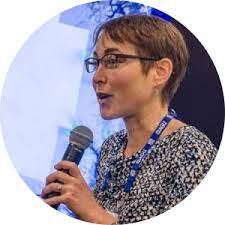“Greenland and Antarctica have been holding vast amounts of water as frozen ice and helping us to maintain very steady sea levels around our coast. And that’s allowed us to build infrastructure, build mega cities, right on the coast where many of our world’s mega cities sit. Now….we’re raising our air temperatures …and that’s adding more water to our oceans, which is arriving at shores around the world… disrupting the infrastructure we built…(and) caus(ing) health and other problems.” Dr. Twila Moon on Electric Ladies Podcast
We hear about melting ice caps as a symbol of global warming. What do they mean? What does the ice caps mean? What does the fact that they’re melting mean? And what does it mean for our cities, towns and communities?
Listen to Dr. Twila Moon, a climate scientist from and the University of Colorado at Boulder’s National Snow and Ice Data Center who specializes in the ice caps – a cryosphere scientist – in this fascinating interview with Electric Ladies host Joan Michelson where she helps us understand what those melting ice caps mean for us.
You’ll hear about:
- Why glaciers matter
- How glaciers melting directly affects our daily lives.
- Why small changes in air temperature directly affect our infrastructure, food and water supplies.
- What we can do in our daily conversations to help people understand the impact of climate change.
- Plus, insightful career advice ….
“So first recognizing that you’re in a continually evolving space of influence and the dreams that you, that position that you were applying for three years ago, take the time now to consider…(that) you might’ve already grown out of that dream and already be able to take on bigger responsibilities or bigger roles. And the second thing is learning how to say no saying no is saying yes to the things already on your plate.” Twila Moon on the Electric Ladies podcast
Read Joan’s related Forbes articles here too.
You’ll also want to listen to:
- Sandrine Dixson, Co-President, The Club of Rome, from COP26, about the need for transformational public-private partnerships to get to net zero.
- Gillian Tett, Financial Times, from COP26, about what the new financial alliance means for a net zero economy.
- Olivia Martin, USAFacts.org, on the State of the Earth in 2021, using various sources of government data.
- Michele Wucker, thought leaders and author of “You Are What You Risk: The New Art & Science to Navigating an Uncertain World.”
Subscribe to our newsletter to receive our podcasts, blog, events and special coaching offers..
Thanks for subscribing on Apple Podcasts or iHeartRadio and leaving us a review!
Follow us on Twitter @joanmichelson









